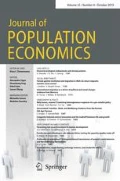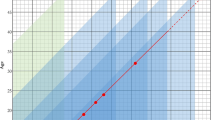Abstract.
The age at which women become mothers has increased to an all time high in most European countries in the past decennia. This increase of age at first birth is the main explanatory variable for the rapid decrease in fertility in European countries which has occurred at different points of time earlier in North and West Europe than in South Europe. To understand the development of the period fertility rate it is therefore crucial to understand the determinants of optimal age at maternity. This paper reviews empirical and theoretical literature and tries to give suggestions on future research directions. The econometric so called timing and spacing literature has used current female wages and male incomes as the main explanatory variables. However, theoretical research identifies on the one hand consumption smoothing, and on the other hand career planning of the woman as the main explanations to the postponement of maternity.
Similar content being viewed by others
Author information
Authors and Affiliations
Additional information
Received: 23 September 1999/Accepted: 15 May 2000
Rights and permissions
About this article
Cite this article
Gustafsson, S. Optimal age at motherhood. Theoretical and empirical considerations on postponement of maternity in Europe. J Popul Econ 14, 225–247 (2001). https://doi.org/10.1007/s001480000051
Issue Date:
DOI: https://doi.org/10.1007/s001480000051




